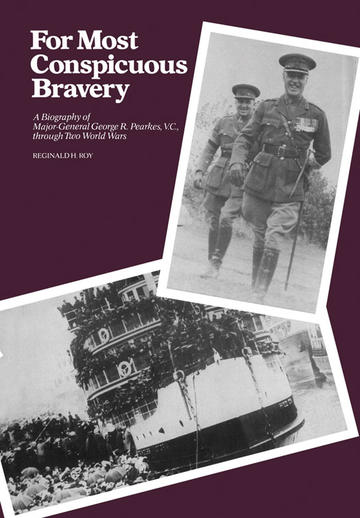About BC Books Online
BC Books Online was created for anyone interested in BC-published books, and with librarians especially in mind. We'd like to make it easy for library staff to learn about books from BC publishers - both new releases and backlist titles - so you can inform your patrons and keep your collections up to date.
Our site features print books and ebooks - both new releases and backlist titles - all of which are available to order through regular trade channels. Browse our subject categories to find books of interest or create and export lists by category to cross-reference with your library's current collection.
A quick tip: When reviewing the "Browse by Category" listings, please note that these are based on standardized BISAC Subject Codes supplied by the books' publishers. You will find additional selections, grouped by theme or region, in our "BC Reading Lists."
"I would have followed him through Hell," said one of the men who was serving with George Pearkes at Passchendaele where he won the Victoria Cross. If his men were devoted to him, he was equally so to them. In the character of this distinguished Canadian soldier and statesman "most conspicuous bravery," "utmost gallantry," and "supreme contempt of danger" were combined with a deep sense of duty and a zeal for service.
Set against the background of Canada's twentieth century transformation from a rural and agricultural society into an urban technological nation, General Pearkes's career makes a compelling biographical study.
After proving up his homestead in Alberta, Pearkes joined the Royal North West Mounted Police and served in the Yukon until he was able to purchase his discharge and enlist in 1915. In Europe he was soon in the trenches, where, wounded five times, he saw the Canadian Army engage in battle after battle on the Western Front and win a reputation as an elite corps.
In the two decades between the World Wars Pearkes served in the small permanent force as district commander, deputy commandant at the Royal Military College, Kingston, and as Director of Military Training in Ottawa. Neglect and apathy in the 1920's and financial stringencies and isolationism in the 1930's made the task of maintaining the militia in a state of preparedness increasingly difficult.
When the inevitable war broke out in September 1939, Pearkes was among those who had to forge the weapon. Until late in 1942, when he was recalled to Canada to take charge of the Pacific Command, Pearkes served overseas training the 2nd Brigade and later the 1st Division as the Battle of Britain was waged overhead and plans and techniques for the eventual invasion of Europe were perfected. Back in Canada he became involved in the major political furore caused by the continuing need for reinforcements. Pearkes's role in the conscription crisis and the "Generals' Revolt" sheds new light on these important issues.
Shortly before the war ended, Pearkes retired, but he soon accepted the call to stand as a member of Parliament. From 1945 to 1960, when he was appointed lieutenant-governor of British Columbia, he served as a Conservative defence critic and as Minister of Defence in the Diefenbaker cabinet. He was deeply involved in the highly charged and hotly debated decisions of the cold war era, including Bomarc, the Arrow, NATO, NORAD, and provisions for civil defence, and his views on them will be significant to those interested in Canadian political and military history.
Reginald H. Roy is Professor of Military History and Strategic Studies at the University of Victoria. He served with the Cape Breton Highlanders from 1939 to 1945 and has published numerous articles and books on military subjects. His books include Ready for the Fray, Sinews of Steel, The Seaforth Highlanders of Canada, 1919-1965, and, in co-peration with Desmond Morton, Telegrams of the North West Rebellion.
Out of print
This edition is not currently available in bookstores. Check your local library or search for used copies at Abebooks.



